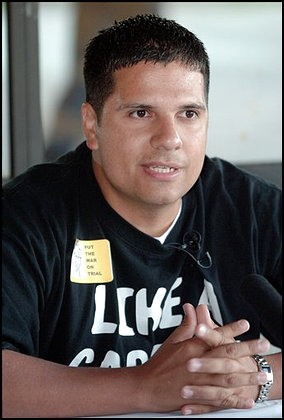 FOR IMMEDIATE RELEASE:
FOR IMMEDIATE RELEASE:PABLO PAREDES SUES NAVY
Pablo Paredes, the San Diego-based sailor who refused to board his Iraq-bound ship last December 6, filed a petition for a writ of habeas corpus in Federal District Court today. The petition says that the Navy improperly rejected his application for discharge as a conscientious objecto and asks the Court to order the Navy to give Paredes an honorable discharge.
“Recognizing the legitimacy of a person's conscientious objection to war is a magnanimous concession that our country yields to it’s citizens. When true and deeply held, such beliefs must be respected, otherwise the first victim of war is a piece of our nation's humanity. I am taking my objection to the federal courts to ensure that a human being's right to a moral opposition to war is respected, and not dismissed capriciously or frivolously as the Navy has done in my case.” – Pablo Paredes.
Paredes’ application for discharge as a conscientious objector was denied by the Navy on July 6, 2005. Since then, Paredes, an Amnesty International declared prisoner of conscience, has been serving the sentence from his court martial. His sentence is scheduled to be completed on October 4, 2005.
The basis of the petition is that, while Paredes’ application showed that he met the criteria to be discharged as a conscientious objector, the Navy denied his request without giving any reason as is required by regulations. Since Paredes made a prima facie case for his opposition to war in any form on the basis of deeply held moral and ethical beliefs, and since the Navy had no reason and no basis in fact for denying his claim, the Navy acted improperly and should now discharge him as a conscientious objector.
Paredes is represented by San Diego Attorneys Jeremy Warren and Robert Swain. According to Swain, Paredes’ prospects in court are good. “The right of service members to challenge denial of conscientious objection claims on the basis that the denial lacks a basis in fact is well established. In this case, the Navy failed to offer any reason at all. He was interviewed by a Chaplain who felt that Pablo’s beliefs were so strong and sincere that he said it was a ‘moral imperative’ that Pablo be discharged as a conscientious objector. In the face of this kind of finding, the Navy said nothing at all.”
Paredes currently faces an administrative board of separation on September 23rd. The Navy will convene a board of officers that will decide the appropriate level of separation. In light of this development, his petition for writ of habeas corpus is key.
On December 6, 2004, Paredes arrived at the 32nd St. Naval Station as his ship, the USS Bonhomme Richard, was preparing to embark with a cargo of Marines for Iraq. Paredes refused to board the ship, saying that he could not participate in transporting Marines to an illegal and immoral war in which many of them might be killed, and in which they would be involved in killing Iraqis. After a brief absence, he returned to the Navy on December 18, 2004. On January 4, 2005, he submitted his request for discharge as a conscientious objector.
Paredes was tried by special court martial and found guilty of missing movement by design. At the court martial, Paredes said that he acted on the basis of conscience and on his understanding of his responsibility as a service member not to participate in war crimes, such as by contributing to a war initiated in violation of international law.
Although he faced a maximum punishment of 12 months confinement, forfeiture of 2/3 pay, reduction in rank, and a Bad Conduct Discharge, Paredes was sentenced to just 60 days restriction, 90 days of hard labor without confinement, and reduction in rank. His sentence was far less than that of other war resisters such as Stephen Funk and Camilo Mejia.
Main Contact: Victor Paredes (917) 864-9179
vicparedes@msn.com
www.swiftsmartveterans.com





